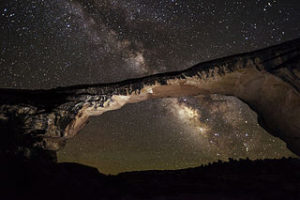
“…and let them be for lights in the firmament of the heaven to give light upon the earth.’ And it was so” (Genesis 1:15). These lights shall also function to provide light to the earth. Rashi explains that the earth itself does not need light. These lights are to provide light for the world which “includes those beings that need light.”1
“And God made the two great lights: the greater light to rule the day, and the lesser light to rule the night; and the stars. And God set them in the firmament of the heaven to give light upon the earth…” (Genesis 1:16-17).
These lights were not created “from the body of the firmament, rather, they were bodies set into it.”3 Rashi explains that these lights were created equal in size but God reduced the size of the moon. Why was the moon reduced in size?
“R. Simeon b. Pazzi pointed out a contradiction [between verses]. One verse says: And God made the two great lights, and immediately the verse continues: The greater light . . . and the lesser light. The moon said unto the Holy One, blessed be He, ‘Sovereign of the Universe! Is it possible for two kings to wear one crown’? He answered: ‘Go then and make thyself smaller’” (Chillun 60b).7
“[A]nd to rule over the day and over the night, and to divide the light from the darkness; and God saw that it was good. And there was evening and there was morning, a fourth day” (Genesis 1:19-20). The lights are told to rule over the earth by the changes they cause in the earth and the power of “bringing about the existence and deterioration of all things in the lower world.”3
The sun rules the day and causes the sprouting, propagation, and growth of all the “warm and dry things”. The moon rules the night and causes the increases in the waters “and all liquid and cold things.”3
“Abraham ibn Ezra said: ‘By the coming forth of the sun at daytime and the light of the moon at night, they shall divide the light from the darkness.’” In Ramban’s opinion, “the light mentioned here refers to the day, and the darkness is the night.”3
“And God said: ‘Let the waters swarm with swarms of living creatures, and let fowl fly above the earth in the open firmament of heaven’” (Genesis 1:20).
According to Rashi, the swarming creatures are considered any living creature that does not stand high off the ground. This would include winged creatures such as flies as well as land creatures such as ants, worms, moles, and mice as well as all fish.1
However, Onkelos translates this verse as “And the Lord said, Let the waters generate the moving creature (having) life and the fowl which flieth over the earth on the face of the expanse of heaven.”8 Here we see that swarming has the implication of movement. The creatures are called swarming “because of their constant movement.”3
According to Rashi the fowl (or winged creature) are the creatures that do not have four legs upon which it moves because its main method of movement is via flying.1
“And God created the great sea-monsters, and every living creature that creeps, with which the waters swarmed, after its kind, and every winged fowl after its kind; and God saw that it was good” (Genesis 1:21).
“[It is written]: And God created the great sea-monsters. Here they explained: The sea-gazelles. R. Johanan said: This refers to Leviathan the slant serpent, and to Leviathan the tortuous serpent, for it is written: In that day the Lord with his sore [and great and strong] sword will punish [Leviathan the slant serpent, and Leviathan the tortuous serpent]. … Rab Judah said in the name of Rab: All that the Holy One, blessed be He, created in his world he created male and female. Likewise, Leviathan the slant serpent and Leviathan the tortuous serpent he created male and female; and had they mated with one another they would have destroyed the whole world. What [then] did the Holy One, blessed be He, do? He castrated the male and killed the female preserving it in salt for the righteous in the world to come; for it is written: And he will slay the dragon that is in the sea.”9
“And God blessed them, saying: ‘Be fruitful, and multiply, and fill the waters in the seas, and let fowl multiply in the earth.’ And there was evening and there was morning, a fifth day” (Genesis 1:22-23). Since these creatures will eventually be hunted and eaten they need a blessing, according to Rashi, so they would not become depleted.1
The creatures were told to be “fruitful and multiply” to fill the earth. God gave this command to ensure that the creatures would have more than one offspring so they would not become depleted in the earth.1
——————–
1Yisrael Herczeg. The Torah with Rashi’s Commentary – Genesis. (New York: Mesorah Publications, Ltd., 2000).
2I. Epstein. Soncino Babylonian Talmud. (London: Soncino Press, 1949). [http://halakhah.com/pdf/moed/Chagigah.pdf]
3Charles Chavel. Ramban Commentary on the Torah – Genesis. (New York: Shilo Publishing House, Inc., 1971).
4I. Epstein. Soncino Babylonian Talmud. (London: Soncino Press, 1949). [http://halakhah.com/pdf/moed/Sukkah.pdf]
5Aryeh Kaplan. The Living Nach: Later Prophets. (New York: Moznaim Publishing Corporation, 1995).
6I. Epstein. Soncino Babylonian Talmud. (London: Soncino Press, 1949). [http://halakhah.com/pdf/zeraim/Berachoth.pdf]
7I. Epstein. Soncino Babylonian Talmud. (London: Soncino Press, 1949). [http://halakhah.com/pdf/kodoshim/Chullin.pdf]
8J. W. Ethridge. On the Pentateuch With The Fragments of the Jerusalem Targum From the Chaldee (1862). [http://targum.info/targumic-texts/pentateuchal-targumim/]
9I. Epstein. Soncino Babylonian Talmud. (London: Soncino Press, 1949). [http://halakhah.com/pdf/nezikin/Baba_Bathra.pdf]
